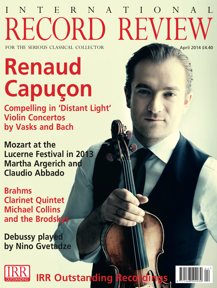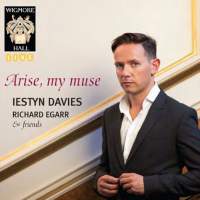Texte paru dans: / Appeared in:
*

International Record Review - (04//2014)
Pour
s'abonner / Subscription information
Whigmore Hall Live
WHILIVE0065

Code-barres / Barcode :
5065000924669
Consultez toutes les évaluations recensées pour ce cd
~~~~ Reach all the evaluations located for this CD
Readers who are showing an interest in this disc should think what the main attraction is for them. If they are considering it for the music it contains, all is well and good. If, however, they want a recital by lestyn Davies they need to know that his contribution lasts for only 47 minutes. (The timing on the back inlay is wrong, for the CD runs for 73
‑minutes, not 59.) It is not one of those for which the potential buyer is led astray by the title. It is what it says: 'lestyn Davies, Richard Egarr and friends', the last group individually named in our title, so one is not being 'cheated' by a disc named 'Alto Arias sung by lestyn Davies', or something similar, only to find that those arias contain a quartet or a rondo for flute and fortepiano, or, indeed, the non‑vocal items here.
One instrumental piece, Gabrieli's Sonata XXI, strikes me as an interloper, but not an unwelcome one, for geographically and chronologically its composer is out of line with the others whose music is performed here. The only non‑English writer, Gabrieli died before the natives were born. His Sonata concentrates on contrapuntal music for three violins supported by harpsichord and theorbo. (No information is given regarding the makers and age of any of the instruments used on this disc.) For his Fantasia, Z731, Purcell employed the same instrumentation plus a viola da gamba in a more invigorating piece.
After the first four Purcell
songs, slowness predominates in this Wigmore Hall recital. As one reads the
heading, it is apparent that, of the composers, Purcell is to the fore with
ten compositions, of which the delightful and elegant 'Fairest Isle' from
King Arthur is the encore, in which Davies produces lovely tone
and some light decorative touches in the second verse. His announcement of
it draws a cry of pleasure from a lady in the audience.
How does one measure a composer's standing? Who deserves the adjective
'great', even if it has any meaning left? (In a quiz programme on BBC
television called Pointless, the host frequently refers to a couple
who have been eliminated in just the second round as having been 'great' or
'brilliant' contestants. Ye Gods!) Would it be any more worthwhile to claim
dogmatically that Purcell is Britain's greatest composer than to pontificate
that he is not? I bet he would receive a substantial number of votes for the
position, and one wonders how many of his predecessors, such as Tallis, Byrd
or Gibbons, covered as wide a field as he did. Of his songs that Davies and
his friends have chosen, If music be the food of love is the
well‑known setting, the one which Alfred Deller recorded on an HMV 78,
whereas heard less often is 'The pale and the purple Rose', a melodious
piece from The Yorkshire Feast Song, sung in warm and honeyed tones
by Davies.
In one or two spots in the recital the vocal line lies low for him, causing his voice to lose body and tone, but such occasions are few and far between, and for the most part he moves smoothly through the songs. In a note (page 9) he comments on his and Egarr's choice of tempo for 'Strike the viol' from Come ye sons of Art. He writes that 'people often treat "Strike the viol" as a slow stately dance ... We tried it like that in rehearsal and found that a faster speed worked much better when doing the piece between "Arise my muse" and "Here the Deities approve".' I have to summon the name of Deller again, for the first time that I heard the song was in the complete recording from L'Oiseau‑Lyre: his version was much slower than Davies's, and although I am not convinced that this new recording is better it is fascinating to hear the different treatment, and Davies and his colleagues are worthy advocates, as they are of all these selections. The two recorders tootle enjoyably in the item from The Yorkshire Feast Song, and the theorbo is soothing in its unaided accompaniment to 0 solitude, my sweetest choice!, confirming the feeling of being alone. Andrew Stewart's note names Kathleen Philips as the writer of the words, but at the end of the printed text of the song Mistress Philips has become Katherine. Stewart states that 0 solitude is 'arguably the finest of all Purcell's ground‑bass songs'; it finds Davies and William Carter displaying their suitability for it.
A couple
more Jeremiah Clarke songs would have been welcome, but we are limited to
the short but pleasing 'The Glory of the Arcadian Groves'. From William
Croft comes Ye tuneful numbers, which consists of a symphony, three
airs and a recitative, adding more variety. Davies again sings with ease, as
he does in Blow's 'Poor Celadon', of a young man whose love for Euginia is
not requited: a sad song sympathetically intoned. This agreeable selection
should satisfy anybody to whom the programme appeals.
Fermer la fenêtre/Close window
Cliquez l'un ou l'autre
bouton pour découvrir bien d'autres critiques de CD
Click either button for many other reviews


